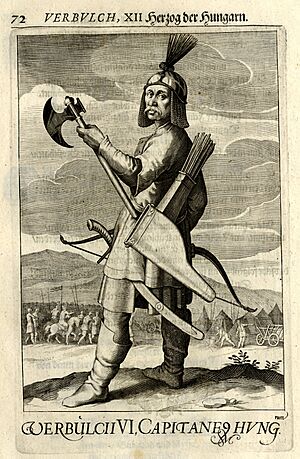Bulcsú (chieftain) facts for kids
Bulcsú (also known as Vérbulcsú) was an important Hungarian leader who lived a long time ago. He was a powerful chieftain and a military commander for Prince Taksony of Hungary. Bulcsú was a descendant of Árpád, a famous early Hungarian leader. He held a special title called horka, which meant he was a high-ranking military and religious leader.
Bulcsú played a big part in the Hungarian invasions of Europe, which were military trips where the Magyars (another name for Hungarians) traveled across Europe. During these times, many people in Western Europe were worried about the Hungarian warriors. There was even a famous saying: "Lord, save us from the arrows of the Hungarians!"
Who Was Bulcsú?
Bulcsú was a key figure during a time when the Hungarian tribes were exploring and expanding their territory. He was known for his leadership in battles and his influence among the Hungarian people. His actions helped shape the early history of Hungary.
A Powerful Leader
As a chieftain and horka, Bulcsú had a lot of power and responsibility. He led armies and made important decisions for his people. He was one of the most respected military leaders of his time, guiding Hungarian warriors on many expeditions.
Journeys to the Byzantine Empire
In the year 948, Bulcsú made an important trip to the Byzantine Empire. He visited the court of Emperor Constantine VII in Constantinople, which was a very grand and impressive place. The emperor welcomed Bulcsú with great honor. During this visit, Bulcsú decided to become a Christian, and Emperor Constantine VII even became his godfather. This was a big deal because it showed a connection between the Hungarians and the powerful Byzantine Empire. Bulcsú was even given the title of "Roman patrician," which was a special honor.
The Battle of Lechfeld
Bulcsú's military career came to an end in 955. His army fought in a very important battle called the Battle of Lechfeld. This battle was a major defeat for the Hungarians. After the battle, Bulcsú was captured by the German forces who had won. Sadly, he was executed on August 10, 955. This battle marked a turning point, as the Hungarian invasions of Europe began to slow down after this defeat.
 | Laphonza Butler |
 | Daisy Bates |
 | Elizabeth Piper Ensley |


